I wanted to write an epic overview of the great Jubilee conference and although we are swimming in the post-conference mess – hundreds of boxes everywhere, paperwork stacked up, odds and ends of stuff I think I promised to do but now can’t quite remember, payments and bills and paperwork galore – I set to sharing why I think this annual CCO event is so very, very wonderful.
Alas, I haven’t had time to trim my sprawling saga, let alone highlight the great 3-day after-Jubilee clearance sale.
So look for that soon. A great story and some notable savings on very good books.
But for now, well, wow.
We get back from last weekend’s big Jubilee with the ginormous rented truck and start loading the boxes from the large said vehicle into our shop, already jam-packed with books.
And I gasp. And not just because of my dangerously sore back. There sitting right in front of me were over ten brand new titles, books that I sure wished I could have gotten in time to take to Jubilee. Mostly early March releases, here a few days early, but a few days late for the big Jubilee display. So it’s good news/bad news – great books now here, but not in time to show off to over 4000 Jubilee participants.
So, we are thrilled to tell you – yes, you! – that these books are just out, brand new, right here, right now. These are not all the new books that we’ve received into the shop this week, but these are spectacular, each and ever one, I’m sure.
I will refrain from exclaiming much; some I’ve read in manuscript form, some I had early chapters, and some are fabulous-looking new paperbacks of important old hardbacks. (Yeah – finally!) All are noteworthy and we’re delighted to tell you about them now. We’ve got them on sale, too.
12 Books I Wished Had Come a Few Days Earlier So I Could Have Promoted Them at Jubilee But Now You Can the Extra Discount
20% OFF
ALL BOOKS MENTIONED
order by clicking on our secure order form link below
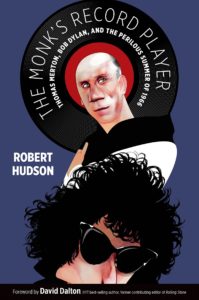 The Monk’s Record Player: Thomas Merton, Bob Dylan, and the Perilous Summer of 1966 Robert Hudson (Eerdmans) $23.99 Oh, if time permitted, I’d love to tell you more about this. Eerdmans, of course, is known for super scholarly Bible commentary, thoughtful contemporary theology, books about a Reformed worldview, and, sometimes, sometimes, just spectacular creative nonfiction. Last year saw Holy Spokes on finding God in the midst of urban biking by Rev. Laura Everett and an amazingly creative and deeply interesting study of “the audacity of ambition” in the Bible study/travelogue The Great Wall of China and the Great Salton Sea by Russell Rathbun. Recently there has been the eloquent book Make a List: How a Simple Practice Can Change Our Lives and Open Our Hearts by the must-read Marilyn McEntyre.
The Monk’s Record Player: Thomas Merton, Bob Dylan, and the Perilous Summer of 1966 Robert Hudson (Eerdmans) $23.99 Oh, if time permitted, I’d love to tell you more about this. Eerdmans, of course, is known for super scholarly Bible commentary, thoughtful contemporary theology, books about a Reformed worldview, and, sometimes, sometimes, just spectacular creative nonfiction. Last year saw Holy Spokes on finding God in the midst of urban biking by Rev. Laura Everett and an amazingly creative and deeply interesting study of “the audacity of ambition” in the Bible study/travelogue The Great Wall of China and the Great Salton Sea by Russell Rathbun. Recently there has been the eloquent book Make a List: How a Simple Practice Can Change Our Lives and Open Our Hearts by the must-read Marilyn McEntyre.
Well, this splendid, much-anticipated book is one of these works of genius that isn’t what you’d typical expect from Eerdmans, but it seems just right coming from them. Kudos, kudos! It will surely be much discussed and the cover alone is almost worth the price of the book. The Monk’s Record Player is a true telling of an episode that isn’t well known among those who follow – and there are a lot who follow and a lot written about – Bob Dylan or the mystic, activist monk, Thomas Merton. The author, Robert Hudson, is himself a huge Dylan fan, a mystic poet (like Merton, you know) and a man of contemplative prayer (he’s the one who got Four Birds of Noah’s Ark back in print again, a prayer book from the time of Shakespeare that we touted as one of the best books of its kind in 2017.) It has a foreword by David Dalton, a New York Times bestselling author and – please note: a founding editor of Rolling Stone Magazine. What a fabulous, rich, multi-dimensional, creative work this is.
And what a heckuva story.
Everybody knows how eccentric and cryptic Bob Zimmy could be. And most who know of Merton know he took a vow of Cistercian silence but couldn’t shut up. And he had a great sense of calling into the literary world, and he had a great sense of humor. I have met people who knew him, and everybody agrees he was, usually, the life of the party.
You maybe know (if I can be allowed a Dylan-esque stream of consciousness moment) that Dietrich Bonhoeffer’s bravery to resist Hitler was nurtured less by his academic study of liberal theology at Union in the 1940s but from his experience of the African American worship at Abyssinian Baptist and, especially their black gospel choir. He took gospel records back with him to Germany and the rest, as they say, is history.
Perhaps somewhat similarly, Merton, as Hudson shows, took some Bob Dylan albums with him as he strode away from and back into the modern world. This book tells the story (which involves Joan Baez, I might add) and it is a story no one else has noticed. As Publishers Weekly puts it, after noting how many books there are on Merton and Dylan already, “shelf room just must be made for this one.”
Listen to Steve Rabey:
Robert Hudson’s revealing ‘parallel biography’ shows how two of the most prolific and influential figures of the 1960s, both perpetually restless spiritual pilgrims, shared a passion for prophetic poetry, an opposition to the war in Viet Nam, and a boundless inquisitiveness. In this enjoyable and insightful book Hudson connects the dots that other Merton scholars have overlooked.
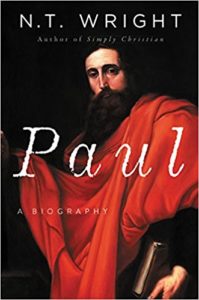 Paul: A Biography N.T. Wright (HarperOne) $29.99 I have been working my way through an early version of this and recalling other great books I’ve loved on Paul, including some of Tom’s own. But this really is nothing like anything I’ve read. There are some other fine bios of the great apostle, but none that are so informed by such a fine scholarly awareness of context and culture.
Paul: A Biography N.T. Wright (HarperOne) $29.99 I have been working my way through an early version of this and recalling other great books I’ve loved on Paul, including some of Tom’s own. But this really is nothing like anything I’ve read. There are some other fine bios of the great apostle, but none that are so informed by such a fine scholarly awareness of context and culture.
It is, as the great Rabbi Jonathan Sacks says of it:
An enthralling journey into the mind of Paul by one of the great theologians of our time, a work full of insight, depth, and generosity of understanding.
Naturally, we love all sorts of books on all sorts of topics. But anything that can help us understand the Bible better is a great gift and anything that can root us so very deeply in the grand Biblical story, and the great, looming character of the last quarter of the story, is certainly to be received with gratitude and taken seriously. I so hope you consider this big book. It’s a combo beach book/historical novel and a magisterial biography.
You know the great biographical work of the likes of Ron Chernow or Walter Isaacson or Barbara Tuchman or Doris Kearns Goodwin. Who knew preacher, pastor, scholar, historian, and great public speaker Tom Wright could use his writing and historical talents to craft a very lively, witty biography? There are blurbs on the back from everybody from Science Mike (McHargue) to Ben Witherington. Tom Holland says, “It is a dream come true.” Very highly recommended.
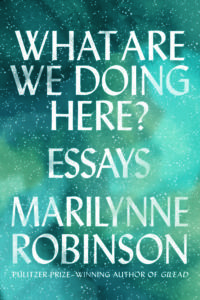 What Are We Doing Here? Essays Marilynne Robinson (Farrar Strauss Giroux) $27.00 I loaned out my advanced copy of this to somebody who had need of it a few months ago, so, alas, I have only read a few of these heady, erudite pieces. We are so glad it is now here, and hope some of our fine thinkers and good friends will order it pronto. It is a well made book; it just feels hefty and nice, released by own of the great old publishing houses, FSG. Allow me to aver that this is one of the most important books of the year as it collects together the theological lectures offered by this literary figure, lectures she mostly gave at very prestigious locations.There are pieces from the University of Virginia, from renowned universities in Sweden and England, lectures from Princeton, Veritas Forum presentations, talks given at Stanford and Harvard and the like. There’s a fine lecture on the “theological virtues” given at Regent College in British Columbia and a few pieces that were later published in swanky, literary outlets like Harpers and The Nation. She is, I’d say, one of a handful of renowned public intellectuals in our time, and in these chapters she “trains her incisive mind on our modern political climate and the mysteries of faith”
What Are We Doing Here? Essays Marilynne Robinson (Farrar Strauss Giroux) $27.00 I loaned out my advanced copy of this to somebody who had need of it a few months ago, so, alas, I have only read a few of these heady, erudite pieces. We are so glad it is now here, and hope some of our fine thinkers and good friends will order it pronto. It is a well made book; it just feels hefty and nice, released by own of the great old publishing houses, FSG. Allow me to aver that this is one of the most important books of the year as it collects together the theological lectures offered by this literary figure, lectures she mostly gave at very prestigious locations.There are pieces from the University of Virginia, from renowned universities in Sweden and England, lectures from Princeton, Veritas Forum presentations, talks given at Stanford and Harvard and the like. There’s a fine lecture on the “theological virtues” given at Regent College in British Columbia and a few pieces that were later published in swanky, literary outlets like Harpers and The Nation. She is, I’d say, one of a handful of renowned public intellectuals in our time, and in these chapters she “trains her incisive mind on our modern political climate and the mysteries of faith”
Robinson has released several other collections of astute and serious prose, including essays on beauty, science, children’s literature, often exploring the limits of the modern ethos, but this may be the very best, at least for those of us who appreciate that she is at once a world-class novelist and theologically aware; she is, in fact, a bone fide Calvin scholar.
Perhaps like Wendell Berry – a very urbane, Reformed Wendell Berry – Robinson is admired and read for her tightly argued essays about public life and beloved for her award-winning novels (Gilead won the Pulitzer, to be followed by the lovely Home and haunting Lila, which allowed for the re-issue of her first book, a gripping, eccentric tale called Homecoming which I hope you’ve read.) What Are We Doing Here? was premiered last week, it is interesting to note, at New York’s Redeemer Presbyterian in Manhattan, at an event sponsored by their important Center for Faith and Work.
Connected in the minds of some to the likes of great thinkers writing about America such as Emerson or Tocqueville, she writes about our American political and cultural life, “deeply impressed by obligation as a great theater of heroic generosity, which, despite, all, is sometimes palpable still.”
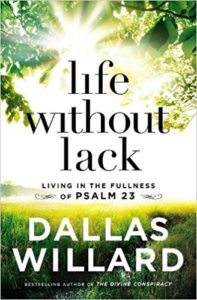 Life Without Lack: Living in the Fullness of Psalm 23 Dallas Willard (Thomas Nelson) $22.99 Just a few weeks ago I was lamenting the lack of an adequate amount of high quality books on the beloved 23rd Psalm. There are a few lovely ones, yes, a few standards, a couple of edgy cool ones, but nothing that is meaty enough to be profound, and none that are truly essential. Interestingly, just two weeks ago I was revisiting some Dallas Willard books, watching him on video, reading John Ortberg’s great books about him. Beth and I met Dallas once, years ago, and in a brand new edition of Richard Foster’s seminal Celebration of Discipline we are reminded in a foreword that it was Dallas who first encouraged Richard to write that important, important book. His sense of how inner transformation works, what Christ’s grace means, practically, is extraordinary.
Life Without Lack: Living in the Fullness of Psalm 23 Dallas Willard (Thomas Nelson) $22.99 Just a few weeks ago I was lamenting the lack of an adequate amount of high quality books on the beloved 23rd Psalm. There are a few lovely ones, yes, a few standards, a couple of edgy cool ones, but nothing that is meaty enough to be profound, and none that are truly essential. Interestingly, just two weeks ago I was revisiting some Dallas Willard books, watching him on video, reading John Ortberg’s great books about him. Beth and I met Dallas once, years ago, and in a brand new edition of Richard Foster’s seminal Celebration of Discipline we are reminded in a foreword that it was Dallas who first encouraged Richard to write that important, important book. His sense of how inner transformation works, what Christ’s grace means, practically, is extraordinary.
So, with Willard’s great philosophical mind (he taught philosophy at USC) and his remarkable awareness of the history of spirituality, the great, great writers of the early church, the Middle Ages, the Monastics and the Reformers and the modern thinkers, too, we should know that his voice was extraordinary, his enduring insight well worth taking in. Books like Renovation of the Heart and Hearing God and The Spirit of the Disciplines are not too heavy, not academic, but are rich resources showing us just how God transforms us from the inside out, making us more like Christ, day by day by day.
His death a few short years ago has been felt across the thoughtful, religious publishing world and it is beautifully to see the tributes and the anthologies. But this is a new book, drawn from a series of talks he gave in his later years. I have not read this yet, but I am sure it will be precious, and more. Life Without Lack will certainly be challenging and helpful, deep and rich and thoughtful.
John Ortberg says,
If you want to know how to live in abundant satisfaction, or how to actually love somebody, or how to spend a day with Jesus, or what work consists of, or how to die to your self so your self might come alive — I can think of no better gift than this glorious unpacking of these grand old words.
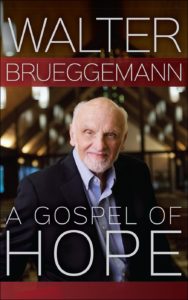 A Gospel of Hope Walter Brueggemann (WJK) $20.00 Old Testament scholar and UCC preacher Walter Brueggemann is endlessly generative – words I’ve heard him say about the Bible itself – and it seems in recent years there has been a good effort to dip into his massive amount of source material and make it available in less daunting and more readily usable ways. There have been some new devotionals and day books, Bible studies and of course collections of sermons. This approach of this slim hardback is a great idea and I hope it is bought widely and shared.
A Gospel of Hope Walter Brueggemann (WJK) $20.00 Old Testament scholar and UCC preacher Walter Brueggemann is endlessly generative – words I’ve heard him say about the Bible itself – and it seems in recent years there has been a good effort to dip into his massive amount of source material and make it available in less daunting and more readily usable ways. There have been some new devotionals and day books, Bible studies and of course collections of sermons. This approach of this slim hardback is a great idea and I hope it is bought widely and shared.
A Gospel of Hope is essentially a collection of paragraphs and sometimes just one or two line quotes from many of his sermons, lectures, Bible studies and scholarly treatises. It is sort of a quotable Brueggemann, picking amazing lines and good quotes and helpful paragraphs, grouped together around 11 different themes.; in his opening introduction he writes about audaciousness and it is both a new piece but vintage Brueggy. Anyway, grouping his ideas by topic and giving us little pieces and quotables is fabulous. From “Abundance and Generosity” to “Alternative Worlds” to “God’s Fidelity and Ours” and on to quotes/sentences about Jesus, Justice, Relinquishment, “Newness and Hope” and more. There is stuff here on public witness and social responsibility and on loving our neighbor. He writes about his own sense of “Evangelical Identity” and invites us to “Faithful Practices.” What a lovely and I think useful little volume.
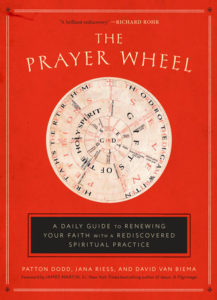 The Prayer Wheel: A Daily Guide to Renewing Your Faith with a Rediscovered Spiritual Practice Patton Dodd, Jana Riess & David Van Biema (Convergent Books) $23.00 Okay, I’ll admit it. I don’t have any idea if this is all it’s cracked up to be, but I’m intrigued. Or at least I’m intrigued with seeing who out there is intrigued. I’m still learning the basics – still crazy after all these years, ya know – and maybe I need some extra ancient-future trick to deepen my rather ordinary prayer life. Maybe maybe not. For what it is worth, I respect these writers a lot and I think they are doing something brave and very interesting. There is a nice foreword by Fr. James Martin, the writer of all things Jesuit, and I trust him considerably.
The Prayer Wheel: A Daily Guide to Renewing Your Faith with a Rediscovered Spiritual Practice Patton Dodd, Jana Riess & David Van Biema (Convergent Books) $23.00 Okay, I’ll admit it. I don’t have any idea if this is all it’s cracked up to be, but I’m intrigued. Or at least I’m intrigued with seeing who out there is intrigued. I’m still learning the basics – still crazy after all these years, ya know – and maybe I need some extra ancient-future trick to deepen my rather ordinary prayer life. Maybe maybe not. For what it is worth, I respect these writers a lot and I think they are doing something brave and very interesting. There is a nice foreword by Fr. James Martin, the writer of all things Jesuit, and I trust him considerably.
As they suggest on the back cover, apparently, from the early Church through the Middle Ages, Christian devoted themselves to prayer with this particular practice that somehow was lost to history. These authors are hoping to re-introduce us to this older practice, inspired by a “stunning medieval artifact that resurfaced in 2015 in a small gallery near New York’s Metropolitan Museum of Art.”
The seven paths of the twelfth century Liesborn Wheel, arranged in a circle around the word Deus (God), lead believers – now as in past times – to encounter and apply transforming truths of the Christian faith.
They explain that this book tells the story of the wheel, guides us through its teachings, and then provides beautiful prayers for personal or group use.
“As you pray,” they suggest, “you will discover new ways to speak to God about your everyday concerns and deepest longings, and find your faith powerfully refreshed.”
Blurbs on the back include lovely notes from Ann Spangler, whose Zondervan books include Praying the Names of God and the respected United Methodist pastor and evangelist Adam Hamilton. In his preface, James Martin says it is “absolutely fascinating reading for the devout and doubtful alike.”
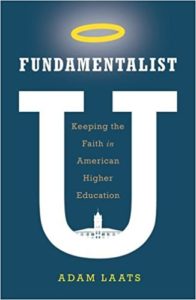 Fundamentalist U: Keeping Faith in American Higher Education Adam Laats (Oxford University Press) $29.99 Despite the cheesy halo on the cover, and the frustrating conflating of evangelical and fundamentalist – – a move the author acknowledges is problematic – this book would have been ideal to show off at Jubilee, if only it had come in time. It’s a great study! I’d even call it vital for campus ministers, faculty, and serious academics or others who care about higher education, especially Christian higher education. (It is my contention that books about Christian higher education – such as the extraordinary Diversity Matters: Race, Ethnicity, and the Future of Christian Higher Education edited by Karen Longman (which we awarded as a Best Book of 2017) – are important for anyone interested in the integrity and health of college and university life. Even campus workers or staff at secular private colleges or church-related liberal arts schools or major state universities should study up on this parallel story within the history of American higher ed. It is why I loved George Marsden’s classic Soul of the American University so very much, and why I think this kind of book is good to make available to anyone working in colleges or universities.
Fundamentalist U: Keeping Faith in American Higher Education Adam Laats (Oxford University Press) $29.99 Despite the cheesy halo on the cover, and the frustrating conflating of evangelical and fundamentalist – – a move the author acknowledges is problematic – this book would have been ideal to show off at Jubilee, if only it had come in time. It’s a great study! I’d even call it vital for campus ministers, faculty, and serious academics or others who care about higher education, especially Christian higher education. (It is my contention that books about Christian higher education – such as the extraordinary Diversity Matters: Race, Ethnicity, and the Future of Christian Higher Education edited by Karen Longman (which we awarded as a Best Book of 2017) – are important for anyone interested in the integrity and health of college and university life. Even campus workers or staff at secular private colleges or church-related liberal arts schools or major state universities should study up on this parallel story within the history of American higher ed. It is why I loved George Marsden’s classic Soul of the American University so very much, and why I think this kind of book is good to make available to anyone working in colleges or universities.
Fundamentalist U is by Adam Laats, Professor of Education and History at Binghamton University and author of The Other School Reformers: Conservative Activism in American Education, which won the History of Education Society’s Outstanding Book Award in 2016. In it, Laats does what we call these days a “deep dive” into the history and current cultures of a dozen well known Christian colleges and universities, institutions such as Wheaton, Moody, Gordon, Liberty, Biola, and others. (See – there are huge differences between fundamentalist hotspots like Bob Jones and Liberty and more clearly moderate evangelical strongholds like Gordon or Wheaton.) By doing bunches of oral histories, tons of archival studies, Laats looks at the issues that shaped the development of these institutions, including their efforts to band together in the CCCU (Consortium of Christian Colleges and Universities.)
Dipping in I was intrigued as we learn about how issues related to science and evolution were handled decades ago in significant debates on several campuses, how modern art was seen and how art departments did or didn’t develop, and how, just for instance, the anti-war student movement was treated in the late 1960s, how the colleges have navigated changes in culture (such as the rise of outspoken LGBTQ students and staff and the ever elusive desire for racial diversity.) Fascinating and important stuff – especially if you have followed any of my own recent reflections here at BookNotes around the book Still Evangelical? which is asking how the shift from fundamentalism to evangelicalism happened in the 20th century and where they may be leading these days. With Billy Graham’s death a week or so ago, this book and the era of the rapid development and growth of Christian higher education is fully germane and we’re happy to recommend it widely.
Here are some of the back cover endorsements:
“Fundamentalist and conservative evangelical colleges face unique tensions. They represent volatile movements plagued by internal struggles and ever-shifting boundaries. They pursue higher learning on behalf of a movement that accused America’s universities of betraying God’s truth and righteousness. And they function as halfway houses for evangelical students who are called to be in the world, but not of it. Adam Laats went deep into the archives of Bob Jones University, Wheaton College, Moody Bible Institute, Biola University, Liberty University and Gordon College, and he tells their stories with great integrity. The result is a major contribution to the history of Christian higher education and to the understanding of fundamentalism and evangelicalism in America.” — Joel Carpenter, Director of the Nagel Institute for the Study of World Christianity, Calvin College
“Adam Laats’s nuanced, detailed, and exceptionally well researched history of twentieth-century conservative Protestant higher education offers a plethora of fascinating information and perceptive insights. It is essential reading even for those well versed in American evangelical history, because it offers a fresh analysis of the complex ways in which fundamentalist colleges reflected (and shaped) their religious movement’s tenuous balance between the demands of the world and the tenets of faith.” — Daniel K. Williams, author of God’s Own Party: The Making of the Christian Right
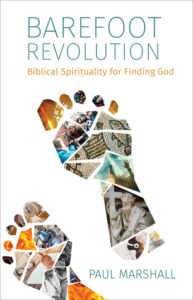 Barefoot Revolution: Biblical Spirituality for Finding God Paul Marshall (Paraclete Press) $16.99 We carry all the lovely books of Paraclete Press and when they did this – the author is a spiritual director in Sydney, Australia, a graduate of Fuller Theological Seminary, and the leader of a charity serving the poor and oppressed called Mustard Seed Global — I knew this one looked special. It is for those looking for God, but also, I gather, for anyone wanting a deeper faith, a more disciplined commitment, a relationship with God that is palpable but also responsible. It is very much about one’s interior life, one’s experience of the love of God but yet it is also about the bigger, adventurous response to that. I think of significant books like Kyle Bennett’s Practices of Love: Spiritual Disciplines for the Life of the World (Brazos Press; $17.99) or other books that offer a balanced sort of inner/outer kind of spirituality, that is both about spiritual formation and the cost of a life of service and robust discipleship.
Barefoot Revolution: Biblical Spirituality for Finding God Paul Marshall (Paraclete Press) $16.99 We carry all the lovely books of Paraclete Press and when they did this – the author is a spiritual director in Sydney, Australia, a graduate of Fuller Theological Seminary, and the leader of a charity serving the poor and oppressed called Mustard Seed Global — I knew this one looked special. It is for those looking for God, but also, I gather, for anyone wanting a deeper faith, a more disciplined commitment, a relationship with God that is palpable but also responsible. It is very much about one’s interior life, one’s experience of the love of God but yet it is also about the bigger, adventurous response to that. I think of significant books like Kyle Bennett’s Practices of Love: Spiritual Disciplines for the Life of the World (Brazos Press; $17.99) or other books that offer a balanced sort of inner/outer kind of spirituality, that is both about spiritual formation and the cost of a life of service and robust discipleship.
I love what Robert Gallagher (a professor of Intercultural Studies at Wheaton) says of Barefoot Revolution:
This is not for the faint-hearted. If you are sincere, however, about embracing God’s revolutionary love, then take off your shoes and read.
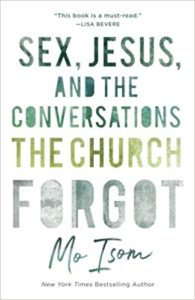 Sex, Jesus, and the Conversations the Church Forgot Mo Isom (Baker) $14.99 I hope you know Mo Isom. Her autobiographical testimony, Wreck My Life was a fun read and popular among young women and men and many sports fans. She is the former All-American goalkeeper for the LSU soccer team that has been featured in all the great sports outlets, from ESPN to Sports Illustrated and has even been featured on SportsCenter Top-10 Plays. She is a widely followed blogger, outspoken Christian who has offered wise and winsome invitations to allow the gospel to shape one’s identity and calling and life.
Sex, Jesus, and the Conversations the Church Forgot Mo Isom (Baker) $14.99 I hope you know Mo Isom. Her autobiographical testimony, Wreck My Life was a fun read and popular among young women and men and many sports fans. She is the former All-American goalkeeper for the LSU soccer team that has been featured in all the great sports outlets, from ESPN to Sports Illustrated and has even been featured on SportsCenter Top-10 Plays. She is a widely followed blogger, outspoken Christian who has offered wise and winsome invitations to allow the gospel to shape one’s identity and calling and life.
Here, she worries that the church is relatively quiet on such a huge, huge topic – human sexuality. I am sure it is lively, faithful, creative, if customarily so. “Sex is God’s idea,” they write on the back cover. “It’s time we invited Him back into the bedroom.”
I am not so sure this offers much that is really new since, ad copy and Ms Isom’s insinuation aside, there are hundreds of books saying just this. Yet, it is said to be written with a “raw vulnerability and a bold spirit.” She shares in this book her own sexual testimony and covers all sorts of stuff from misguided rule-following to temptation, porn, promiscuity, false sexpectations, sex in marriage and more.
She resists shame and she places our human sexuality within the broader story of God’s redemptive plan. That it is written by a young woman (she is married with two young children) is a helpful contribution, too. It would have been great to have this at Jubilee, believe me! Maybe you know a young adult who would appreciate it.
Rave, rave reviews appear on the back from beloved pop Christian leaders such as Lisa Bevere, Jefferson Bethke, and Annie Downs who says that, “Mo is a powerful voice rising in our generation.” We thought you should know about it.
THE GRAND FINALE: THREE NEW PAPERBACK EDITIONS
And, now, the grand finale — a trio of books just converted from hardcover to less expensive paperbacks. We love, love, love these books and a few we have been wishing for paperback editions for a very long time. We are truly delighted to recommend them to you now, at our 20% off sale price. If you want a hardback at an deep discount of 40% off, contact us right away as we may be able to do that for you for the next few days. We’ll see what we can do for you.
We may have hardbacks of these three still in stock so if you want hardbacks at 40% off, while supplies last, just this week, let us know.
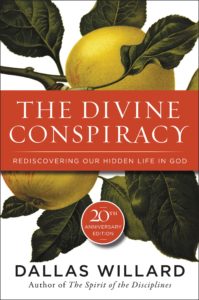 The Divine Conspiracy: Rediscovering Our Hidden Life in God Dallas Willard (HarperOne) $14.99 Yes, finally, in a brightly-colored, lovely cover (which they have called a 20th Anniversary Edition.) This surely has been one of the great books of the last twenty years and, even though it is a study of the reign of God and the Sermon on the Mount, it is more about spiritual formation, about character formation, about living well within this ecology of a God-given life. Many a reader has found it to be among the best books they’ve ever read. Others find it an introduction to Dallas Willard and some of his other books are among their all time favorites. There is little doubt it is esteemed, wonderful, important.
The Divine Conspiracy: Rediscovering Our Hidden Life in God Dallas Willard (HarperOne) $14.99 Yes, finally, in a brightly-colored, lovely cover (which they have called a 20th Anniversary Edition.) This surely has been one of the great books of the last twenty years and, even though it is a study of the reign of God and the Sermon on the Mount, it is more about spiritual formation, about character formation, about living well within this ecology of a God-given life. Many a reader has found it to be among the best books they’ve ever read. Others find it an introduction to Dallas Willard and some of his other books are among their all time favorites. There is little doubt it is esteemed, wonderful, important.
This is the book about which Richard Foster has said:
I consider The Divine Conspiracy to be the most important book in the field of Christian spirituality written in my lifetime.
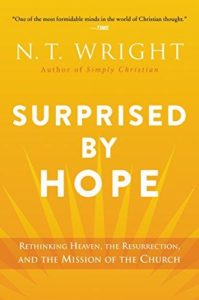 Surprised by Hope: Rethinking Heaven, The Resurrection, and the Mission of the Church N.T. Wright (HarperOne) $15.99 Since the Jubilee conference goes out of its way to frame Kingdom living as joining God’s mission in the world, hoping for the full restoration of the good but fallen creation, it is a shame this book didn’t arrive until the day after the conference. In many ways, those authors who have most influenced the CCO in these matters – I’m thinking Al Wolter’s and his Creation Regained and Brian Walsh & Richard Middleton’s Transforming Vision – have themselves influenced N.T. Wright, it seems that this is truly one of the most significant books of recent decades for my own Jubilee tribe, saying afresh and with great detail what we said when we started the conference with some Kuyperians more than 40 years ago. Surprised by Hope is more heady and detailed than most undergrads may want to tackle, but it is simply a must-read. (I have used the DVD curriculum for it more than once.)
Surprised by Hope: Rethinking Heaven, The Resurrection, and the Mission of the Church N.T. Wright (HarperOne) $15.99 Since the Jubilee conference goes out of its way to frame Kingdom living as joining God’s mission in the world, hoping for the full restoration of the good but fallen creation, it is a shame this book didn’t arrive until the day after the conference. In many ways, those authors who have most influenced the CCO in these matters – I’m thinking Al Wolter’s and his Creation Regained and Brian Walsh & Richard Middleton’s Transforming Vision – have themselves influenced N.T. Wright, it seems that this is truly one of the most significant books of recent decades for my own Jubilee tribe, saying afresh and with great detail what we said when we started the conference with some Kuyperians more than 40 years ago. Surprised by Hope is more heady and detailed than most undergrads may want to tackle, but it is simply a must-read. (I have used the DVD curriculum for it more than once.)
United Methodist writer and former Bishop Will Willimon says:
This is simply the best book we have on the substance of Christian hope.
Rob Bell writes,
This book is N.T. Wright at his finest: dismantling the tired old theologies of escapism and evacuation to help a whole generation of us more clearly grasp a Jesus revolution for her, now, today.
My, my, this is important stuff. It is an essential study of what heaven is and isn’t, what we mean by the Kingdom of God, what happens when we die, and why in the world the creedal affirmation of the resurrection of the body is essential, and more significant than you ever realized. We are so glad this is more affordable and in a sleek new paperback edition. Get it today.
The new cover design, by the way, sits on the shelf very nicely next to the paperbacks of Case for Psalms, How God Became King, Simply Good News and the brand new paperback of Simply Jesus. Nice.
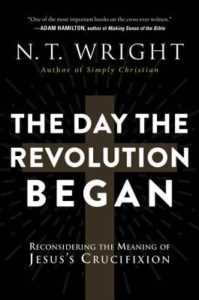 The Day the Revolution Began: Reconsidering the Meaning of Jesus’s Crucifixion N.T. Wright (HarperOne) $18.99 Well, this could be a perfect book to dive into these very next weeks as we move towards Holy Week and a more intentional time of reflection on the meaning of the cross. Indeed, the popular Adam Hamilton has said that “One of the most important books on the cross ever written.”
The Day the Revolution Began: Reconsidering the Meaning of Jesus’s Crucifixion N.T. Wright (HarperOne) $18.99 Well, this could be a perfect book to dive into these very next weeks as we move towards Holy Week and a more intentional time of reflection on the meaning of the cross. Indeed, the popular Adam Hamilton has said that “One of the most important books on the cross ever written.”
I agree. And here’s why: if NT Wright has helped us understand more fully the that true gospel is that the Kingdom of God has been inaugurated, and that God’s redemptive, covenantal, rescue plan has begun (and been decisively vindicated in the cross and resurrection) then we must ask, beyond the resurrection proving that God wins over Death and evil, why did Jesus die? Why the cross? That is, what do we mean by the atonement?
In this stunning, well-documented (440 paperback pages), study, Wright looks at every key New Testament passage about the cross and interprets the meaning of the text in light of the “new creation” paradigm that he proposes. His scholarly books work it out, but his popular level ones like Surprised by Hope and How God Became King all show that God is restoring his good but fallen creation into a renewed Earth, a fresh start for His good world. The reality of “new creation” — which means a (re)new(ed) one, actually, this fallen/disrupted world healed and restored, returned to fully reconciled, God-glorifying beauty – has been our own motivation for selling books for these 35 years; God cares about this world and we need to be attentive to God’s redemptive work within it, both in creation and the promise of new creation.
So, here, Wright explores the cross in light of the big promissory vision of restore creation that he insists upon. If he is right that we aren’t heaven bound, but that God intends to restore his good world, then how does the blood shed, the cross, the Good Friday and Easter story point us there. That is the project of The Day the Revolution Began and I think it is brilliant. We are delighted to offer it to you now at our special sale price.
BookNotes

SPECIAL
DISCOUNT
ANY ITEM MENTIONED
20% Off
order here
takes you to the secure Hearts & Minds order form page
just tell us what you want
inquire here
if you have questions or need more information
just ask us what you want to know
Hearts & Minds 234 East Main Street Dallastown, PA 17313
read@heartsandmindsbooks.com
717-246-3333
